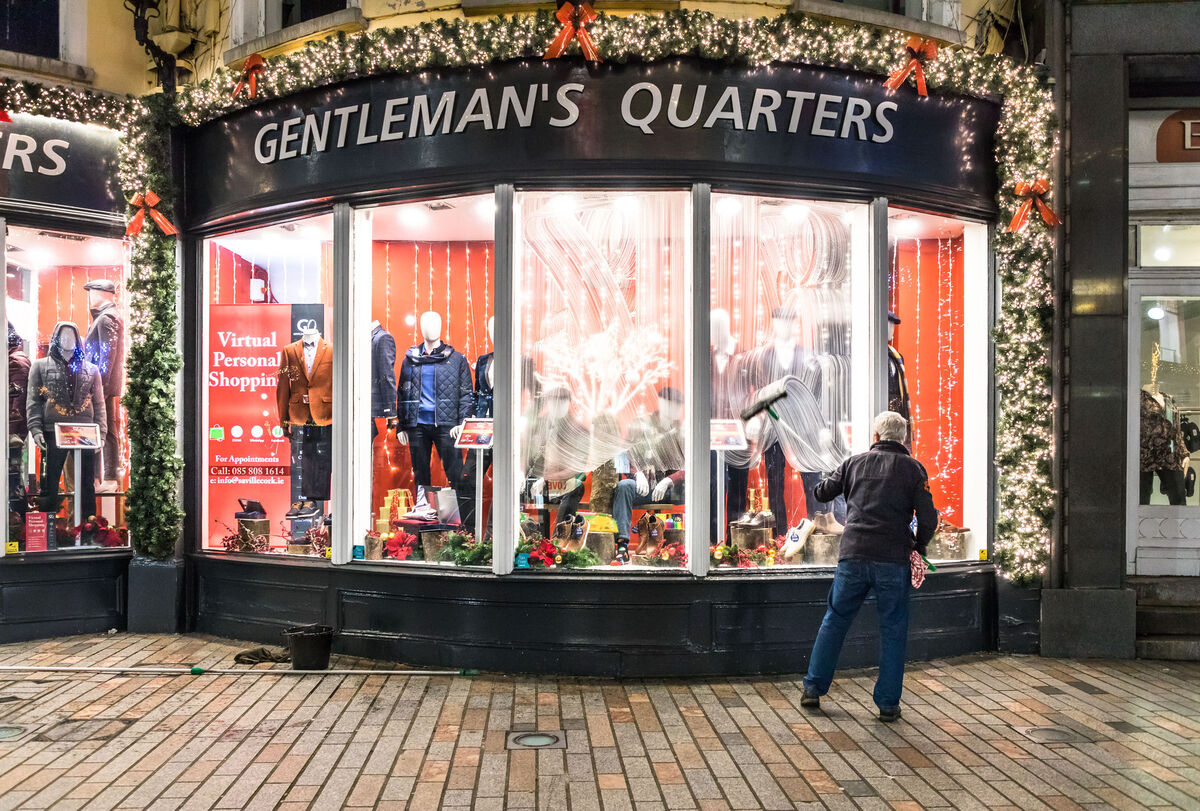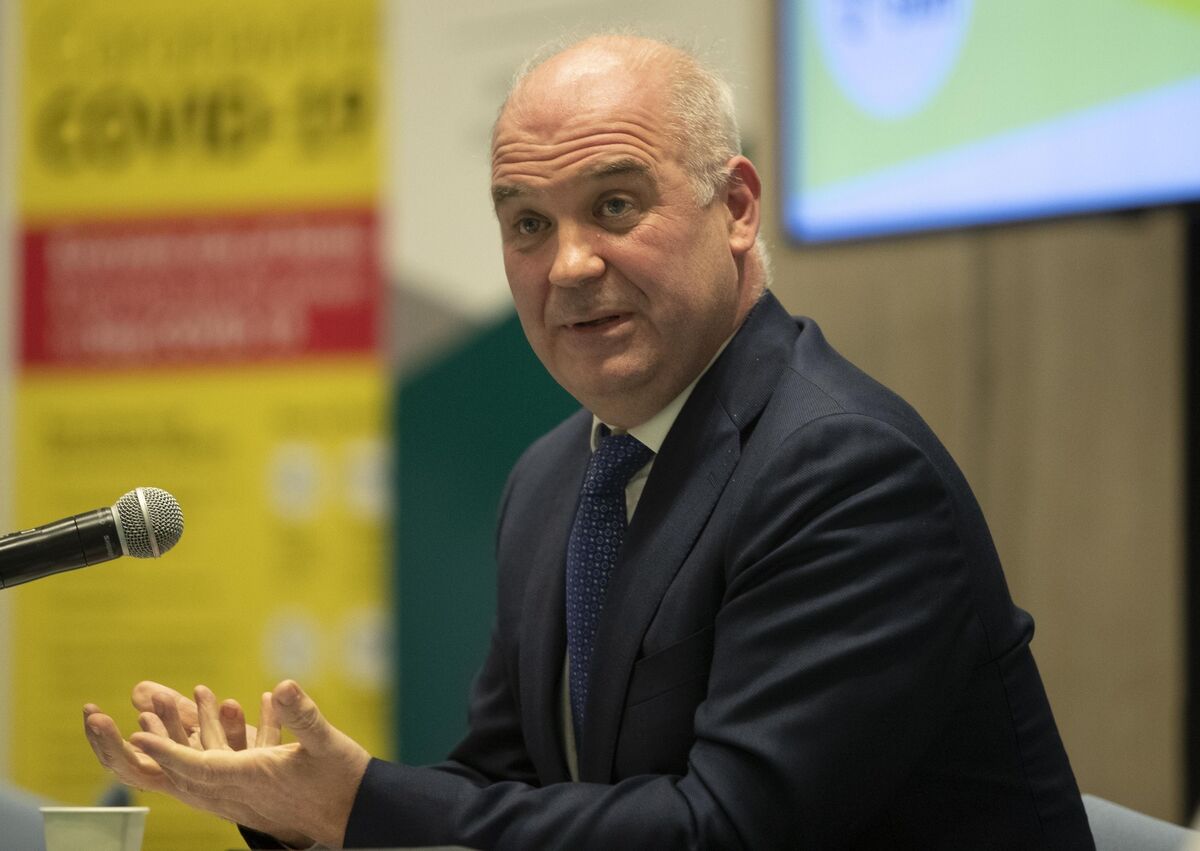Ireland eases out of second lockdown, but CMO warns to 'stay away from crowds'

Customers queue outside Brown Thomas on Patrick Street in Cork as Level 5 restrictions lift on December 1. Picture Dan Linehan/Twitter
People queued outside of shops early this morning as level 5 Covid-19 restrictions were eased.
Non-essential retail shops, hair and beauty providers, gyms and leisure centres will be opening back up from today.
Cinemas, museums and galleries will also be able to reopen, but pubs serving food and restaurants will remain closed until Friday.
Public transport capacity will be increased from 25% to 50% to cope with the additional demand.
Two Penneys' stores in Dublin are opening for 24 hours to deal with customer demand, while another in Limerick has opened its doors early, however, the queues outside the store on St Patrick's Street in Cork is reportedly quiet for the moment.
As restrictions are eased, wedding guests and mourners at funerals will be limited to 25 while no organised indoors events are permitted.
Gatherings of up to 15 people are allowed outdoors, while non-contact training may take place outdoors and in pods of 15, while individual training is permitted indoors.
Gyms, leisure centres and swimming pools were reopening for individual training from Tuesday.
Hotels, B&Bs and non-essential retail were also resuming trading.
People are still being urged to work from home and public transport is limited to 50%. People have also been advised to stay within their own county.
Places of worship, museums, galleries, libraries and cinemas will also reopen, but wet pubs are closed except for takeaways.
Last night, Chief Medical Officer Tony Holohan urged people not to rush out to shops and restaurants in the coming weeks, for fear of causing a surge in cases.
As the country begins to reopen, the country's leading medics have warned people to avoid busy locations to ensure they can enjoy greater levels of contact with their loved ones over the Christmas period.
Dr Holohan and his colleagues in Nphet said the level 5 measures had saved hundreds of lives and staved off potentially thousands of cases of the coronavirus, and that there was not an "inevitability" of a fresh spike in case numbers in the coming weeks if people adhere to public health guidelines.
However, he warned the public needs to be wary, urging people to avoid crowded shops and streets, and to wear masks in busy environments.
Asked about the possibility that people might hold Christmas parties, Dr Holohan said: "It should not be happening."
Dr Holohan also said the high-level task force on Covid-19 vaccination will deliver the National Covid-19 Vaccination Strategy and Implementation Plan to Government by the end of next week, but he said he would not be drawn on which groups of people should be first administered any vaccine once it becomes available.

He also warned that public health measures will still need to be followed even after the vaccine is rolled out.
The task force is due to deliver its report to Government by December 11.
Ireland has signed up to the Pfizer and AstraZeneca vaccinations — both of which have published positive early indicator reports recently.
Both Pfizer and AstraZeneca are now looking for market authorisation within the coming weeks.
That news comes as the latest figures from the Health Protection Surveillance Centre (HPSC) showed one additional death related to Covid-19 and 306 new confirmed cases.
The latest fatality means 119 people died from the coronavirus in November.
The HPSC also confirmed there were 259 people in hospital due to Covid-19, and 31 people in intensive care units.
Retailers and businesses will finally return to some sort of normality in the coming days and may see a burst of consumer activity ahead of Christmas.
Dr Holohan said he would have liked to have seen lower recent case numbers and accepted that moving to level 3 would bring challenges, but he said: "That doesn't mean that the scenario of further spread or exponential spread is some sort of a certainty or inevitability."

Suppressing the virus would mean people not feeling "compelled" to enter crowded areas such as shops or public transport, he said, while Dr Ronan Glynn, Deputy Chief Medical Officer, said: "Just because you can do things tomorrow, doesn't mean you should."
He said people planning on seeing friends or relatives at Christmas should plan ahead now, which meant continuing to limit their daily contacts.
Dr Holohan said: "Stay away from crowded shops, stay from a crowded street, stay away from a crowded bus."
As for another typical aspect of the festive period, he said: "Travelling this Christmas is going to be very challenging for people, the movement of people leads to the movement of the virus, movement of the virus is what spreads infection — it's as simple as that."
Dr Glynn said: "We are particularly concerned that people would come together in groups, whether in restaurants or others settings, because that has implicit in it an increased risk both in terms of individuals but also in terms of our ability to control this disease."
Dr Holohan said that alcohol was a common factor in the spread of Covid-19, while also expressing some concerns about virus caseloads in hospital and nursing home settings and among health workers.
As the country moves to level 3, An Garda Síochána said it would be altering its policing operation to reflect the changes.
That will mean the scaling back of some checkpoint activity but the continuing of high visibility patrols in key urban, and retail locations in the run-up to Christmas and a focus on the night-time economy.





